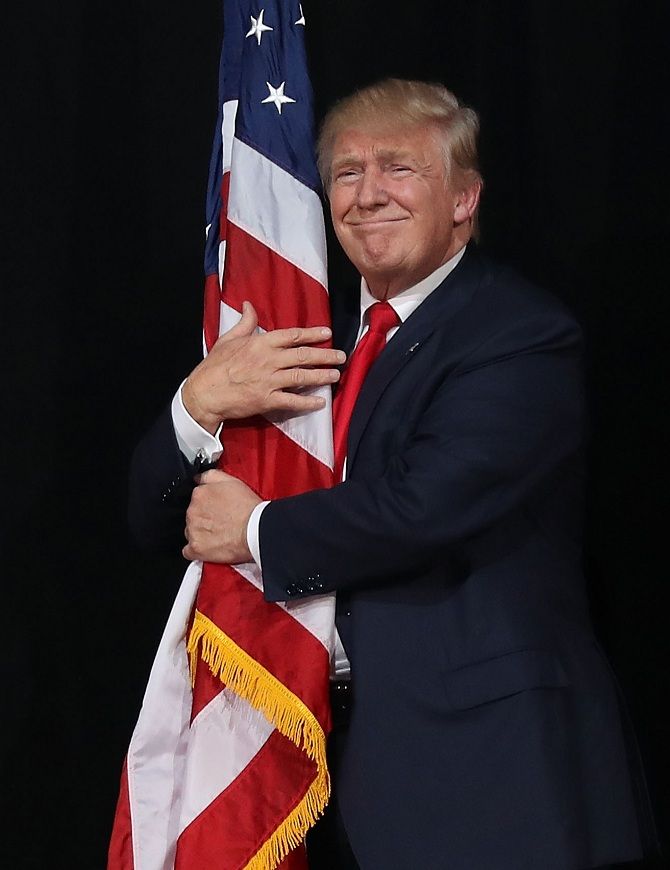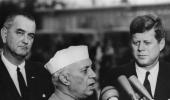With Donald Trump the appeal has to be to his business instincts in which his personal interests seem to play a significant role, says former foreign secretary Ambassador Kanwal Sibal.

All countries are being forced to assess how Donald Trump's ascension to the United States presidency affects their existing relations with the US. This includes allies and friends of the US as well as those considered its adversaries.
India has invested hugely in ties with the US, particularly in the last dozen years or so, spawning a strategic partnership.
Yet, with Trump as president, the confidence that India-US relations were on an assured track has been attenuated.
Trump's electoral agenda was focused on Making America Great Again, America First, loss of manufacturing jobs, unfair trade practices of which the US was a victim, threatening China with trade restrictions, rejecting free trade arrangements, better ties with Russia, scolding the European Union on its defence and trade policies, Islamic radicalism, restrictions on entry of Muslim refugees and so on.
None of these issues directly touched Indian interests except H-1B visa policies, which were seen as causing loss of service jobs in the US information technology sector.
In reality, some key positions that Trump took could be seen as opening up opportunities for strengthening India-US understandings further.
Trump's arm-twisting of China on trade and South China Sea militarisation could have served to rein in China's geopolitical ambitions in Eurasia and in the Indian Ocean.
Improvement of ties with Russia would have loosened the latter's tightening strategic embrace of China.
A more robust policy towards Islamic radicalism and terrorism could have had a beneficial impact in our region by inducing Pakistan to abjure terrorism.
Trump's opposition to US military interventions abroad and his unwillingness to impose American ways and values on others were other elements of his agenda that carried appeal for India as the turmoil caused by such American policies has impacted us negatively by aggravating the threat of Islamic extremism and terrorism worldwide.
But then Trump has proved unpredictable and inconsistent.
He now boasts of a personal rapport with Chinese President Xi Jinping, and has muted any talk of trade restrictions on China.
Commending China for cooperation in dealing with North Korea -- a process China will cleverly stretch out -- inevitably means easing pressure on it on South China Sea issues.
The White House participated in Xi's Belt and Road jamboree in Beijing intended to bolster China's geopolitical hold over Eurasia and eliminate the already weak US influence there.
This bonhomie towards China will call for a re-assessment on our part of the American commitment to the Joint Strategic Vision for Asia-Pacific and Indian Ocean regions signed under Obama's watch.
On Russia, the US intelligence and security agencies, the Democrats, some key Republicans, the think-tank circuit, the media and even the key members of the Trump team have made any outreach to Russia politically impossible.
On Islamic radicalism and terrorism, Trump's courting of Saudi Arabia for arms sales and promoting a Sunni front against Iran shows again American readiness to feed Islamic extremism for geopolitical ends.
Targeting Qatar on terrorism on behalf of Saudi Arabia is remarkably cynical.
The Trump administration is not reducing economic and military aid to Pakistan; the CENTOM chief, while commending Pakistan's cooperation in counter-terrorism efforts has faulted India's efforts to diplomatically isolate Pakistan and consequently obstruct the resumption of dialogue.
The US has now revived the Quad group on Afghanistan that includes China, promoting a Chinese role in the region in disregard of India's concerns.
The deeply entrenched American prejudices against India continue getting reflected in the writings of US strategic specialists -- the most recent (June 16) being in The New York Times by former US national security adviser Stephen Hadley along with a Pakistani.
In their eyes, Pakistani concerns about the Indian threat to Pakistan through Afghanistan have a basis, and a US role is recommended in restarting the India-Pakistan dialogue as an incentive to Pakistan to cease support to the Taliban.
US military attacks against targets in Syria and the demonisation of Iran are steps that contradict Trump's initial position against military interventions abroad and value based diplomacy.
Trump's aggressive posture in Iran risks complicating Indian-financed projects there, given the already existing sensitivities of the Indian financial institutions about any violation of the highly complex US sanctions on Iran.
On economic issues, the Americans have always had gripes about India not opening up its economy sufficiently, its high tariff structure, its patent law, its intellectual property rights violations and so on.
We have had face-offs with the Americans in the World Trade Organisation on trade facilitation and agricultural issues.
The US trade representatives have always viewed India negatively as a hindrance to freer trade and investment regimes. Even under Obama, the US had negative views on India's trade, investment and IPR policies.
Trump is openly protectionist, to the extent that in the G7 discussions in Sicily on May 27 the US resisted till the last minute the traditional reference in the final document to opposition to protectionism.
Under Trump and his team, including the new USTR with a tough reputation, India will come under increased pressure to further open up its market for American goods and services, particularly as the USTR has threatened to use all means, bilateral as well as US laws, to achieve that goal.
Trump's order in March to review in 90 days, country by country, product by product, the causes of the US trade deficit includes India although the US trade deficit (goods and services) with India is very modest at $30.8 billion compared to $347 billion in China's case, but not so small when compared to $55 billion with Japan and about $28 billion with South Korea.
Our laudable project of Make in India in manufacturing conflicts with Trump's Make in US.
While the administration cannot direct the powerful US corporate sector to do as he pleases, the atmosphere has become less congenial. In that context, the Defence Technology and Trade Initiative could lose steam and the Tata-Lockheed Martin agreement to manufacture F-16s in India may prove a counter-current move.
On H-1B visas, Trump and his economic team being more strident in their opposition, we may not obtain too much of a reprieve.
But if the US is unmoved by our arguments, it will be more problematic for India to buckle to US pressure on market opening. India would want to operate under the WTO regime rather than bend to bilateralism with the US.
On climate change issues, too, the common ground Modi and Obama astutely forged has got eroded by Trump's disavowal of the Paris Agreement.
Modi's Washington visit will test his diplomatic skills and his ability to strike a personal rapport with foreign leaders.
His mastery over the details of India's economic ambitions and his vision for India's future impresses his hosts.
With Trump the appeal has to be to his business instincts in which his personal interests seem to play a significant role.
Trump's family is a powerful actor on the business side and they have to accessed.
The road to Trump's heart lies through lucrative business deals for America that the president can boast about.
We have to wait and watch what Modi can conjure from his hat during his Washington visit.
Kanwal Sibal retired from the Indian Foreign Service as Foreign Secretary.











 © 2025
© 2025